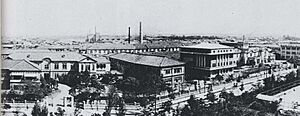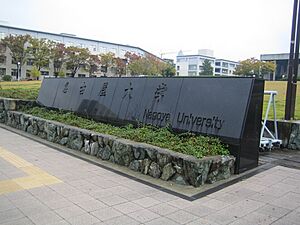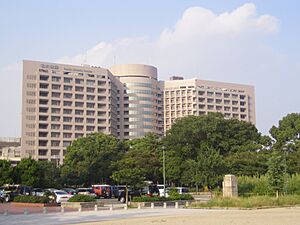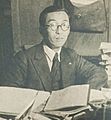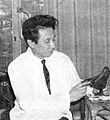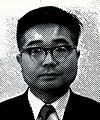Nagoya University facts for kids
|
名古屋大学
|
|
 |
|
| Motto | 勇気ある知識人 (courageous intellectual) |
|---|---|
| Type | Public (national) |
| Established | 1871 (Chartered 1939) |
| President | Naoshi Sugiyama |
|
Academic staff
|
3,847 (2020) |
| Undergraduates | 9,585 (2020) |
| Postgraduates | 6,187 (2020) |
| Location |
,
,
35°09′17″N 136°58′01″E / 35.15472°N 136.96694°E |
| Campus | Urban, 3.2 km² |
| Colors | Pine Green |
Nagoya University (名古屋大学, Nagoya daigaku) is a top-ranked national university in Nagoya, Japan. People often call it Meidai (名大) or NU. It is known for its excellent research, especially in science.
The university was officially founded in 1939 as one of Japan's Imperial Universities, which were the most important universities in the country at the time.
Nagoya University is famous for its achievements in physics and chemistry. As of 2021, seven people connected to the university have won the Nobel Prize. This is the third-highest number for any university in Japan and Asia.
Contents
History
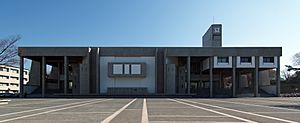
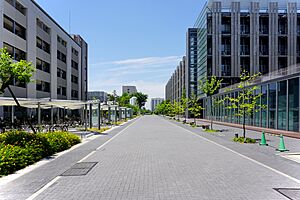
Nagoya University officially began in 1939 as Nagoya Imperial University. After World War II, in 1947, it was renamed Nagoya University.
Even though it became a university in 1939, its story started much earlier. Its roots go back to a temporary medical school and hospital that opened in 1871.
The university is famous for major scientific discoveries. These include the Okazaki fragment (which helped explain how DNA copies itself), Noyori asymmetric hydrogenation (a way to make important chemicals), and the invention of the Blue LED.
In 2020, Nagoya University joined with Gifu University to form the Tokai National Higher Education and Research System. This created the largest national university group in Japan.
Nobel Prizes
Nagoya University is a powerhouse for science. Many of Japan's Nobel Prize winners in the 21st century have studied or worked at the university.
Out of the seven Nobel winners linked to the university, four were professors and three were students. The 2021 Nobel Prize winner in Physics, Syukuro Manabe, was a special professor at the university for several years.
What the University is Like
Main Ideas
Nagoya University encourages its students to be "courageous intellectuals." This means they want students to think for themselves and be brave in their ideas. The university is known for its "freedom, openness, and enterprising" spirit.
Students
Most students at Nagoya University come from the Tōkai region of Japan. However, many students also come from other parts of the country.
The university is also very international. As of 2021, it had over 1,900 students from more than 110 different countries.
Departments and Schools
Faculties (for undergraduate students)
- Humanities
- Education
- Law and Political Science
- Economics
- Informatics (the study of information and computers)
- Science
- Medicine
- Engineering
- Agriculture
Graduate Schools (for advanced studies)
- Humanities
- Education and Human Development
- Law and Political Science
- Economics
- Informatics
- Science
- Medicine
- Engineering
- Bioagricultural Sciences
- International Development
- Mathematics
- Environmental Studies
- Pharmaceutical Sciences
Research Institutes
Nagoya University has many world-class research centers where scientists make amazing discoveries.
- Institute of Transformative Bio-Molecules (ITbM): Scientists here study "bio-molecules," which are the tiny building blocks of living things. They work on solving problems related to plants, health, and biology.
- Institute for Space-Earth Environmental Research (ISEE): This institute studies the environment of our planet and outer space. The goal is to help solve global environmental problems.
- Institute of Materials and Systems for Sustainability (IMaSS): Researchers here create new materials and systems to help save energy and build a greener society.
- Kobayashi-Masakawa Institute for the Origin of Particles and the Universe (KMI): Named after two Nobel Prize winners, this institute studies the smallest particles in the universe to understand how everything began.
Campus Life
Clubs and Circles
Nagoya University has a Federation of Liberal Arts Circles, which started in 1961. "Circles" are student clubs. There are over 60 official circles for activities like tea ceremony, art, music, dance, and volunteering.
Sports
The university has an Athletic Association with more than 50 sports clubs. Every year, Nagoya University competes against Osaka University in a big sports event. It also takes part in the Seven Universities Athletic Meet, a competition between the seven former Imperial Universities.
Meidai-sai Festival
Every June, the university holds a big festival called "Meidai-sai." It's been a tradition since 1960. The festival has about 100 different events, including tours of the science labs, presentations, and fun activities. Clubs also set up food stalls selling treats like yakisoba (fried noodles) and kakigōri (shaved ice).
Academic Rankings
| THE National | General | 8 | |
|---|---|---|---|
| T. Reuters National | Research | 5 | |
| WE National | Employment | 38 | |
| NBP Hokuriku/Tokai | Reputation | 1 | |
| Shimano National | Selectivity | SA | |
| QS Asia (Asia version) |
General | =32 | |
| THE Asia (Asia version) |
General | =48 | |
| THE World | General | 201–250 | |
| QS World | General | 164 | |
| ARWU World | Research | 101–150 | |
| Social Sciences & Humanities | |||
|---|---|---|---|
|
LAW
|
|||
| Asahi National | Research | 4 | |
| Natural Sciences & Technology | |||
|
Engineering
|
|||
| Kawaijuku National | General | 6~7 | |
| QS World | General | 96 | |
|
PHYSICS
|
|||
| T.Reuters National | Research | 6 | |
| T.Reuters World | Research | 61 | |
|
CHEMISTRY
|
|||
| T.Reuters National | Research | 7 | |
| T.Reuters World | Research | 43 | |
|
BIOLOGY & BIOCHEMISTRY
|
|||
| T.Reuters National | Research | 5 | |
| T.Reuters World | Research | 97 | |
| * T. Reuters World rankings include non-educational institutions | |||
Nagoya University is known as one of the best universities in Japan and around the world.
General Rankings
In 2021, the Academic Ranking of World Universities (ARWU) ranked Nagoya University as the 3rd best in Japan and 84th in the world. The QS World University Rankings for 2022 placed it at 118th in the world.
Research Performance
Nagoya University is a top research university. It is ranked 6th in Japan for the quality of its scientific research. It is especially strong in Physics, Chemistry, and Biology. The university also has a high number of patents, which are special rights given for new inventions.
International Education
Global 30 Project
Nagoya University offers special programs where all classes are taught in English. This is part of the Global 30 (G30) International Programs, which started in 2011. This allows students from other countries to study subjects like science, engineering, and law without needing to know Japanese at first. International students in these programs are still required to take Japanese classes to help them learn the language.
Exchange Programs
The university has many exchange programs for students. One of the biggest is NUPACE, where students from partner universities around the world can study at Nagoya for up to a year. There are also special programs for students interested in engineering, law, and Japanese language.
Students from Nagoya University can also study abroad at hundreds of partner universities.
Famous People from Nagoya University
Physics and Materials
-
Makoto Kobayashi, won the 2008 Nobel Prize in Physics for his work on particle physics.
-
Toshihide Maskawa, also won the 2008 Nobel Prize in Physics with Makoto Kobayashi.
-
Isamu Akasaki, won the 2014 Nobel Prize in Physics for inventing the energy-saving blue LED light.
-
Hiroshi Amano, also won the 2014 Nobel Prize in Physics for the blue LED.
-
Syukuro Manabe, won the 2021 Nobel Prize in Physics for creating models of Earth's climate.
- Sumio Iijima, a physicist who is famous for discovering carbon nanotubes.
Chemistry and Biology
-
Koji Nakanishi, a chemist who studied chemicals found in nature. He was a professor at Columbia University.
-
Ryōji Noyori, won the 2001 Nobel Prize in Chemistry. He spent most of his career at Nagoya University.
-
Osamu Shimomura, won the 2008 Nobel Prize in Chemistry for discovering the green fluorescent protein (GFP), a tool used in biology.
-
Yoshito Kishi, a famous chemistry professor at Harvard University.
- Reiji Okazaki, a biologist who worked with Tsuneko Okazaki to discover the Okazaki fragments.
Mathematics
-
Shigefumi Mori, won the Fields Medal in 1990, which is like the Nobel Prize for mathematics.
-
Masaki Kashiwara, a mathematician who won the 2025 Abel Prize, another top award in math.
Business and Politics
-
Shoichiro Toyoda, the former CEO of Toyota Motor Corporation.
- Tang Jun, President and CEO of a large Chinese company.
- Le Thanh Long, the Deputy Prime Minister of Vietnam.
See also
 In Spanish: Universidad de Nagoya para niños
In Spanish: Universidad de Nagoya para niños
 | Sharif Bey |
 | Hale Woodruff |
 | Richmond Barthé |
 | Purvis Young |


